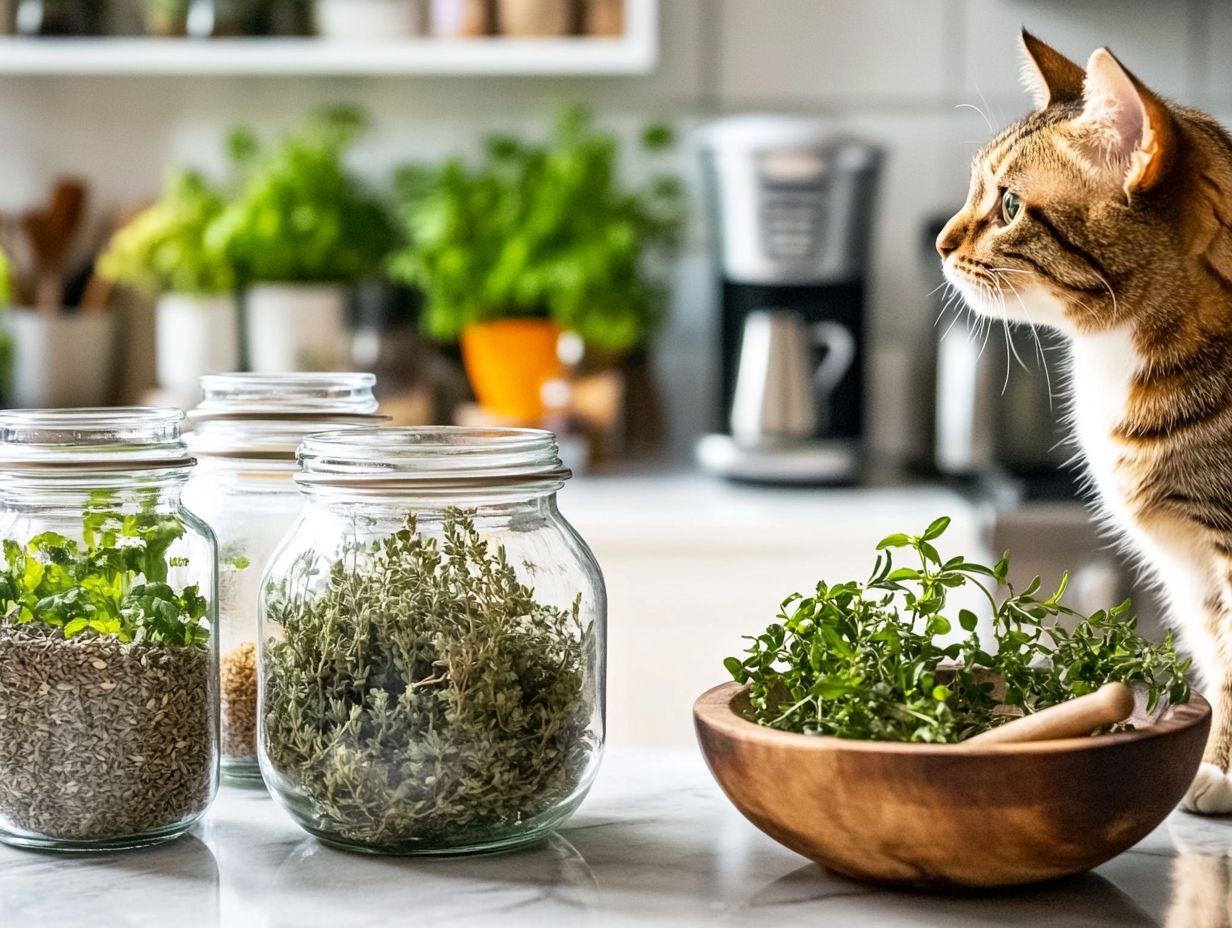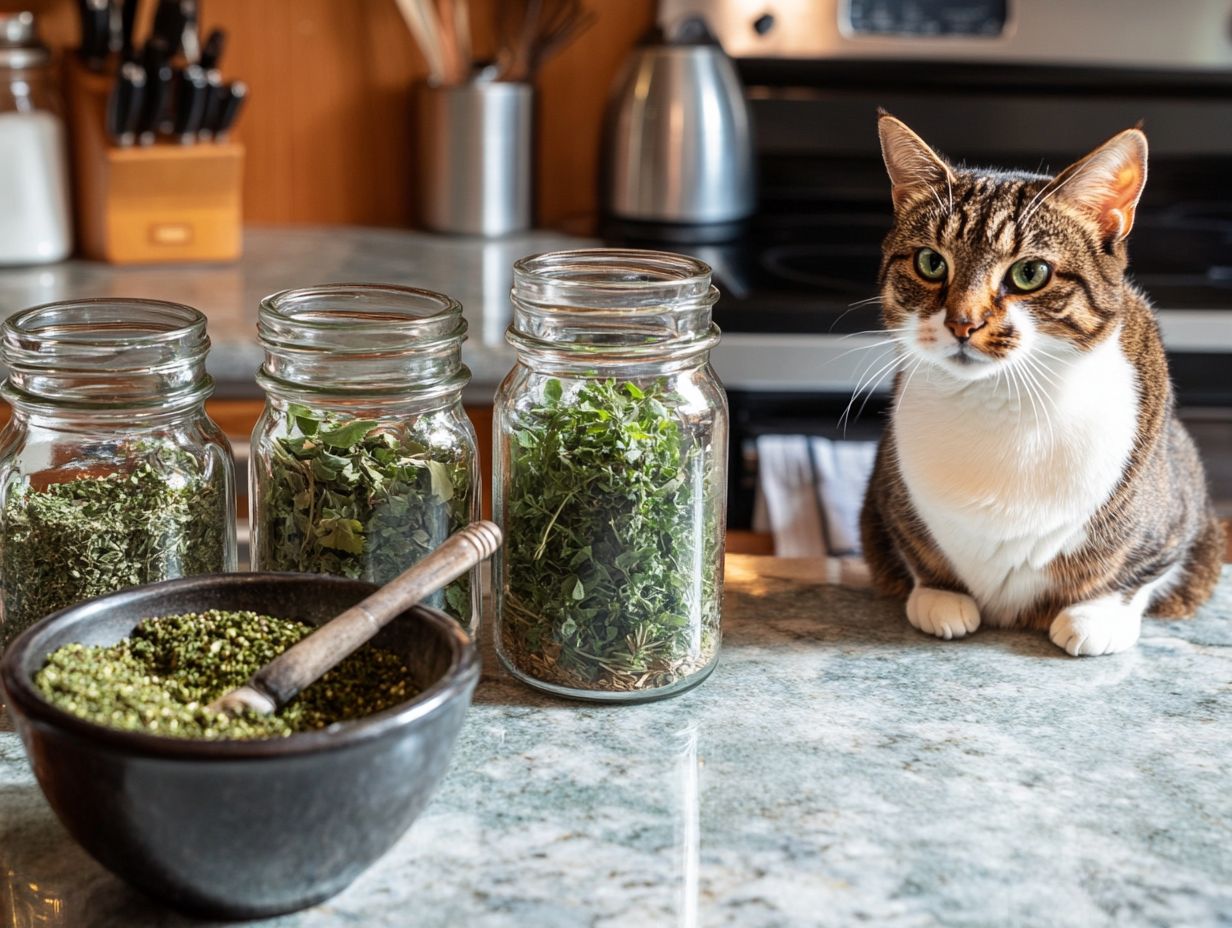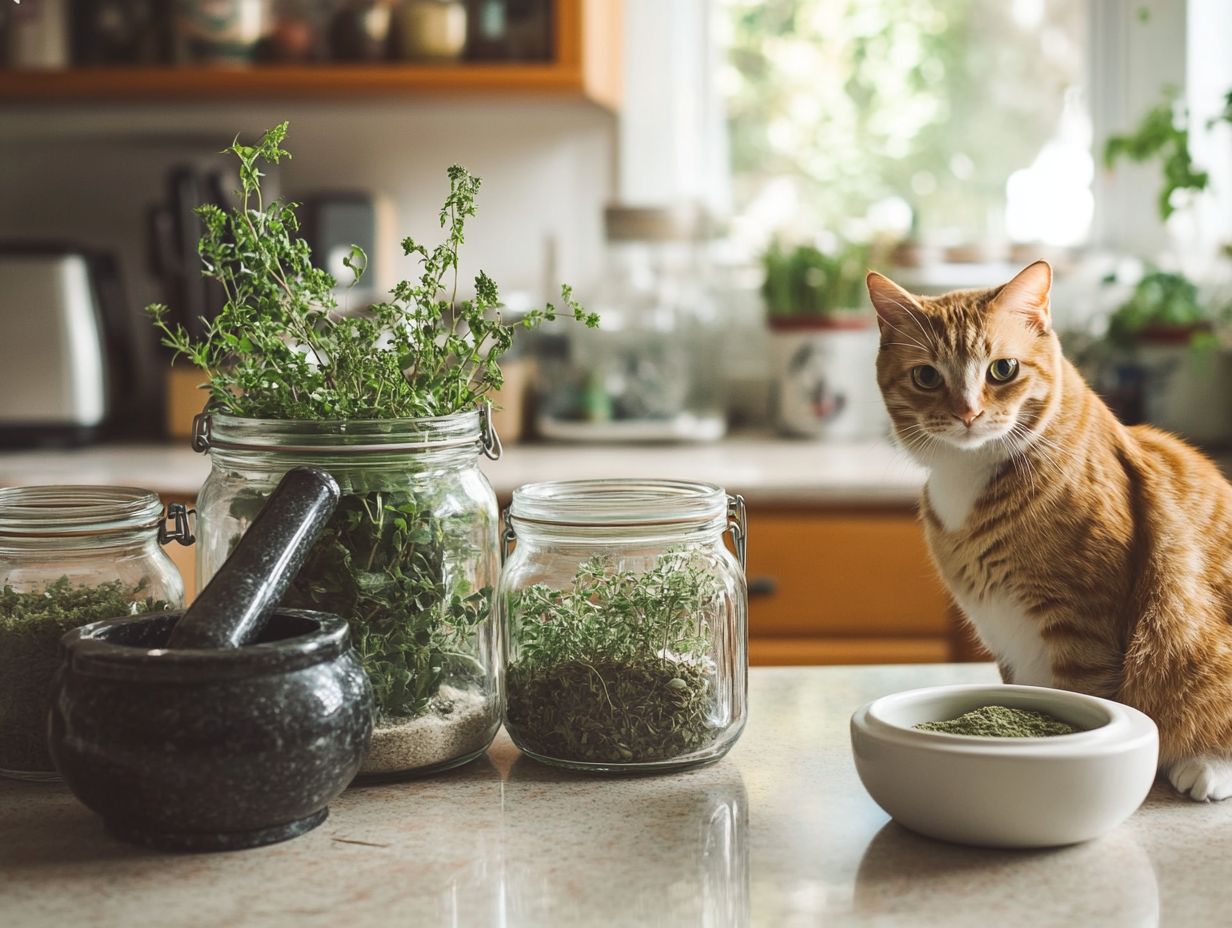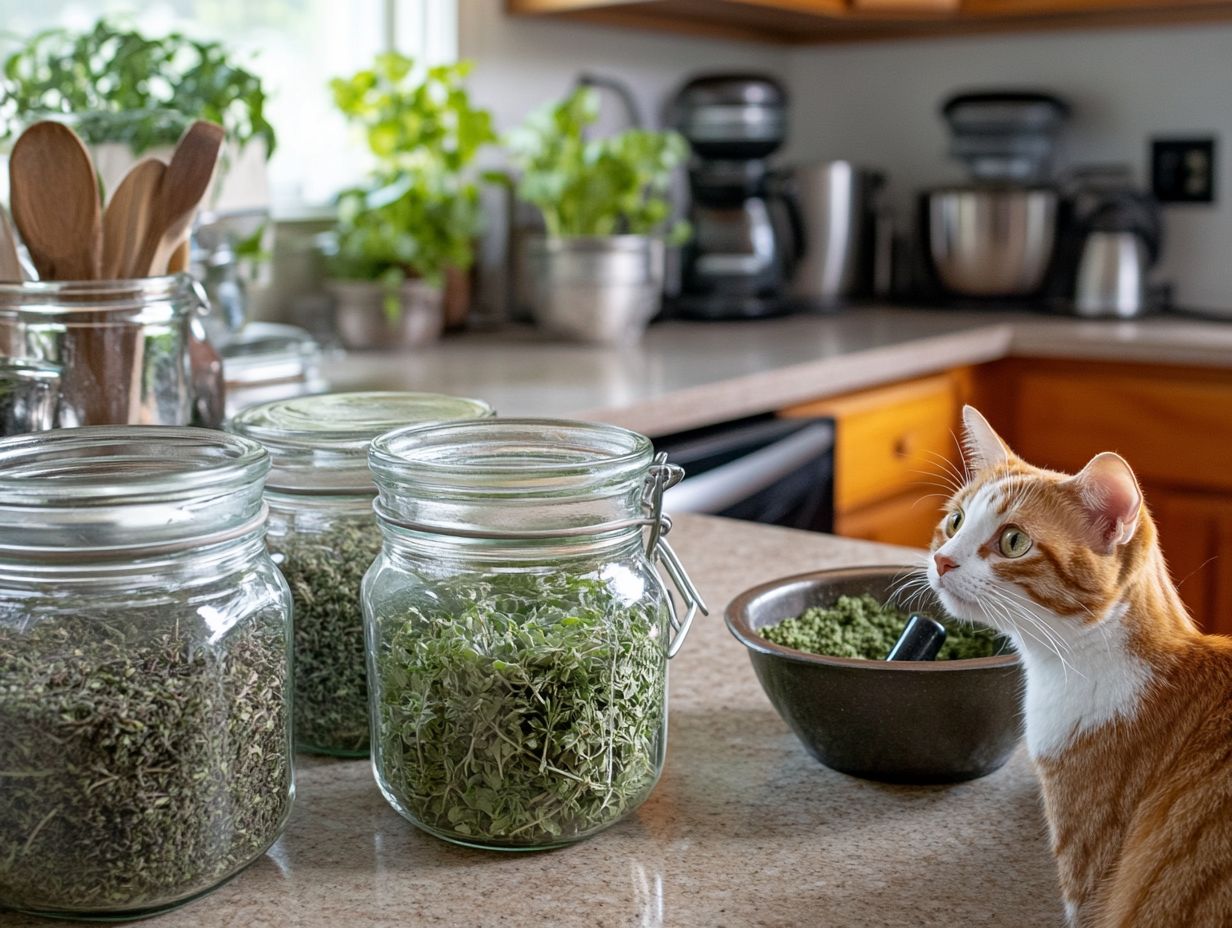How to Create Herbal Remedies for Pets
Herbal remedies have become increasingly popular among pet owners looking for natural alternatives to conventional treatments.
It’s essential for you to understand both the benefits and limitations of these remedies, as well as which herbs are safe and effective for your pets.
This article delves into common herbs used for pet health, offering guidance on preparation methods and highlighting important safety considerations.
You’ll find discussions on remedies for specific ailments, along with an emphasis on the necessity of consulting with a veterinarian.
Embark on this journey with us as we uncover the world of herbal care for your beloved pets!
Contents
- Key Takeaways:
- Understanding Herbal Remedies for Pets
- Common Herbs Used for Pet Remedies
- Preparing Herbal Remedies for Pets
- Safety Considerations for Herbal Remedies
- Using Herbal Remedies for Specific Pet Ailments
- Consulting with a Veterinarian
- Frequently Asked Questions
- What are herbal remedies for pets, including homeopathic treatments and herbal medicine?
- How do I create herbal remedies for pets?
- What are some common herbs used in pet remedies?
- What are the benefits of using herbal remedies for pets?
- Can I use the same herbal remedies for pets as for humans?
- Are there any risks involved in using herbal remedies for pets?
Key Takeaways:

- Understand the benefits and limitations of using herbal remedies for your pets.
- Familiarize yourself with common herbs used for pet remedies and their effectiveness in treating various health issues.
- Take necessary precautions and consult with a veterinarian before preparing and administering herbal remedies for your pets.
Understanding Herbal Remedies for Pets
Understanding herbal remedies for pets invites you to explore a diverse array of natural treatments designed to enhance health and alleviate ailments without relying heavily on conventional medications.
These remedies often draw from ancient wisdom, encompassing approaches such as herbal medicine, homeopathy, and nutritional therapy.
They aim to provide relief for pets dealing with issues like muscle strains or insect bites. It’s crucial for you to acknowledge both the benefits and limitations of these natural treatment methods, particularly in ensuring they harmonize with regular veterinary care.
Benefits and Limitations
Herbal remedies present a variety of benefits for your pet, offering potential pain relief and utilizing natural ingredients like aloe vera and calendula flowers.
However, it s essential to recognize that these remedies also come with certain limitations that you should keep in mind.
Embracing a holistic approach to pet care can significantly enhance overall well-being, ultimately improving your companion’s quality of life.
Ingredients such as ginger root, renowned for its anti-inflammatory properties, and tea tree oil, celebrated for its antiseptic qualities, can serve as valuable elements in your pet’s health regimen.
Always be cautious for your pet’s safety! Not all herbal treatments are suitable for every pet. Consulting with a veterinary professional before introducing any new remedies ensures that they align with your pet’s specific needs and health conditions. For those interested in DIY approaches, consider reviewing creating herbal remedies: safety tips to help you avoid any unintended consequences.
Common Herbs Used for Pet Remedies
Common herbs used for pet remedies hold immense potential in offering natural solutions to a range of health concerns. By harnessing the therapeutic properties inherent in plants such as ginger, aloe vera, and calendula flowers, you can promote healing and overall wellness for your beloved companions.
Overview of Popular Herbs
An overview of popular herbs like aloe vera, calendula, and ginger root reveals their unique medicinal properties and applications in pet care, making them invaluable in the realm of natural remedies.
These herbs can offer a multitude of benefits, addressing various health issues in pets, including skin irritations, digestive problems, and inflammatory conditions.
For instance, you ll find that aloe vera is renowned for its soothing properties, effectively alleviating skin discomfort and promoting healing when applied topically.
However, it s important to exercise caution, as ingestion can lead to gastrointestinal upset in pets.
On the flip side, calendula shines with its anti-inflammatory and antimicrobial properties, making it an excellent choice for wound healing, though it should be used judiciously in animals with allergies.
Ginger root, too, is widely celebrated for its ability to aid digestion and reduce nausea, proving particularly helpful for pets that experience motion sickness.
Incorporating these herbs into your pet s routine can significantly enhance their well-being, but don t forget to consult a veterinarian first to ensure safety and the right dosages.
Start exploring herbal remedies today for a happier, healthier pet!
Preparing Herbal Remedies for Pets

Preparing herbal remedies for your pets requires good knowledge of various methods and techniques. This understanding enhances the effectiveness of natural treatments, ensuring that the remedies you create are not only safe but also tailored to meet the specific needs of your beloved companions.
Methods and Techniques
The methods and techniques for preparing herbal remedies can vary significantly. They range from simple infusions to more intricate tinctures. Each method is crafted to effectively harness the medicinal properties of herbs.
Understanding these diverse preparation methods is essential for anyone with a keen interest in herbal medicine. To craft herbal teas, you simply steep dried or fresh herbs in hot water for a few minutes. This allows the active compounds to leach out and become readily accessible to your body.
Tinctures, on the other hand, are concentrated herbal extracts made by soaking herbs in alcohol or vinegar for several weeks. This process extracts their potent constituents into a concentrated liquid that can be taken in smaller doses.
If you prefer more standardized dosages, capsules filled with powdered herbs offer a convenient approach while still delivering the therapeutic benefits associated with herbal remedies. Each method serves a unique purpose, beautifully reflecting the rich traditions of natural methods.
Safety Considerations for Herbal Remedies
When exploring herbal remedies for your pets, always prioritize safety to ensure your pet’s well-being. Some herbs can present potential risks, making it imperative for you to conduct thorough research and consult with veterinary professionals.
Taking these steps will help ensure the well-being of your beloved companions.
Potential Risks and Precautions
Understanding the potential risks and precautions associated with herbal remedies is essential for you as a pet owner. Some herbal treatments can interact negatively with conventional medications or may not be suitable for all pets.
While herbs are often seen as safe and natural alternatives, they can harbor hidden dangers, especially concerning specific breeds or underlying health conditions. It’s crucial for you to recognize that not every remedy is harmless; some may trigger adverse reactions or worsen existing health issues. To safely explore this topic, consider learning how to create your own herbal remedy.
Before introducing any herbal supplement into your pet’s diet, having a thorough discussion with a veterinarian is vital. This ensures you receive tailored guidance based on your pet’s unique health profile, empowering you to make informed decisions that prioritize your companion’s well-being and safety. Additionally, if you’re interested in making your own remedies, consider learning how to create herbal tinctures easily.
Using Herbal Remedies for Specific Pet Ailments
Herbal remedies can be a fantastic way to deliver pain relief and reduce stress for your pets! They present a natural alternative to conventional medications for common health issues that pets often encounter, including muscle strains and insect bites.
Effective Remedies for Common Health Issues

Effective remedies for common health issues often involve a thoughtful blend of herbal solutions that target specific conditions. This approach offers holistic care for your pets.
For example, if your pet is grappling with anxiety or stress, adding ingredients like chamomile and valerian root to their routine can work wonders, promoting relaxation and a sense of calm. Additionally, for those interested in natural remedies, learning how to create herbal skin treatments at home can be beneficial. For pets facing pain or discomfort from conditions like arthritis, integrating turmeric or ginger can significantly alleviate inflammation and provide much-needed relief.
By embracing these targeted herbal solutions, you can nurture a more balanced and healthier lifestyle for your furry companions. The beauty of crafting your own herbal remedies at home lies in their ability to support overall wellness while effectively addressing specific ailments, ensuring your pets maintain their vitality and happiness.
Consulting with a Veterinarian
Consulting with a veterinarian is a crucial aspect of pet care, especially when you’re contemplating the inclusion of herbal remedies in your pet’s health regimen. This step ensures that any treatment you consider is both safe and effective for your beloved companion.
Take the first step today and explore the world of herbal remedies for your furry friend!
When to Seek Professional Advice
Knowing when to seek professional advice about your pet’s health is essential. This is particularly important if you re considering herbal remedies or if your pet shows symptoms that demand immediate attention, such as insect bites.
If you notice any warning signs in your pet, such as sudden loss of appetite, excessive vomiting, or unusual lethargy, don t wait! Visit your veterinarian immediately to ensure their health and happiness.
When contemplating herbal treatments, remember that not all natural remedies are safe. Some might cause problems with conventional medications or worsen existing health issues, especially medical marijuana, a type of cannabis used for medical purposes.
A qualified veterinarian, like Dr. Judy Morgan or Dr. Carol Osborne, can offer tailored advice, ensuring that your pet receives the safest and most effective care possible. This ultimately fosters a healthier, happier life for your cherished companion.
Frequently Asked Questions
What are herbal remedies for pets, including homeopathic treatments and herbal medicine?
Herbal remedies for pets are natural treatments made from plants and herbs that can improve your pet’s health and well-being.
How do I create herbal remedies for pets?

To create herbal remedies for pets, research and select appropriate herbs and plants, such as aloe vera and calendula flowers. Prepare them properly and administer them in the correct dosage for your pet.
What are some common herbs used in pet remedies?
Common herbs used in pet remedies include chamomile, ginger root, turmeric, and echinacea, along with other effective options like calendula. Always consult with a veterinarian and seek advice before using any herbs on your pet.
What are the benefits of using herbal remedies for pets?
Herbal remedies for pets offer many benefits. They are all-natural, have fewer side effects, and are often more cost-effective compared to traditional medications, also providing stress relief.
Can I use the same herbal remedies for pets as for humans?
No, you should never use the same herbal remedies for pets as for humans. Some herbs safe for humans can be toxic to pets, and pets may require different dosages and preparations.
Are there any risks involved in using herbal remedies for pets?
While herbal remedies for pets can be safe and effective, there are still some risks involved. Potential reactions to essential oils like tea tree oil or ginger can occur. It is crucial to consult with a veterinarian and conduct thorough research before using any herbal remedies on your pet, such as using a herbal first-aid kit or exploring acupuncture.






